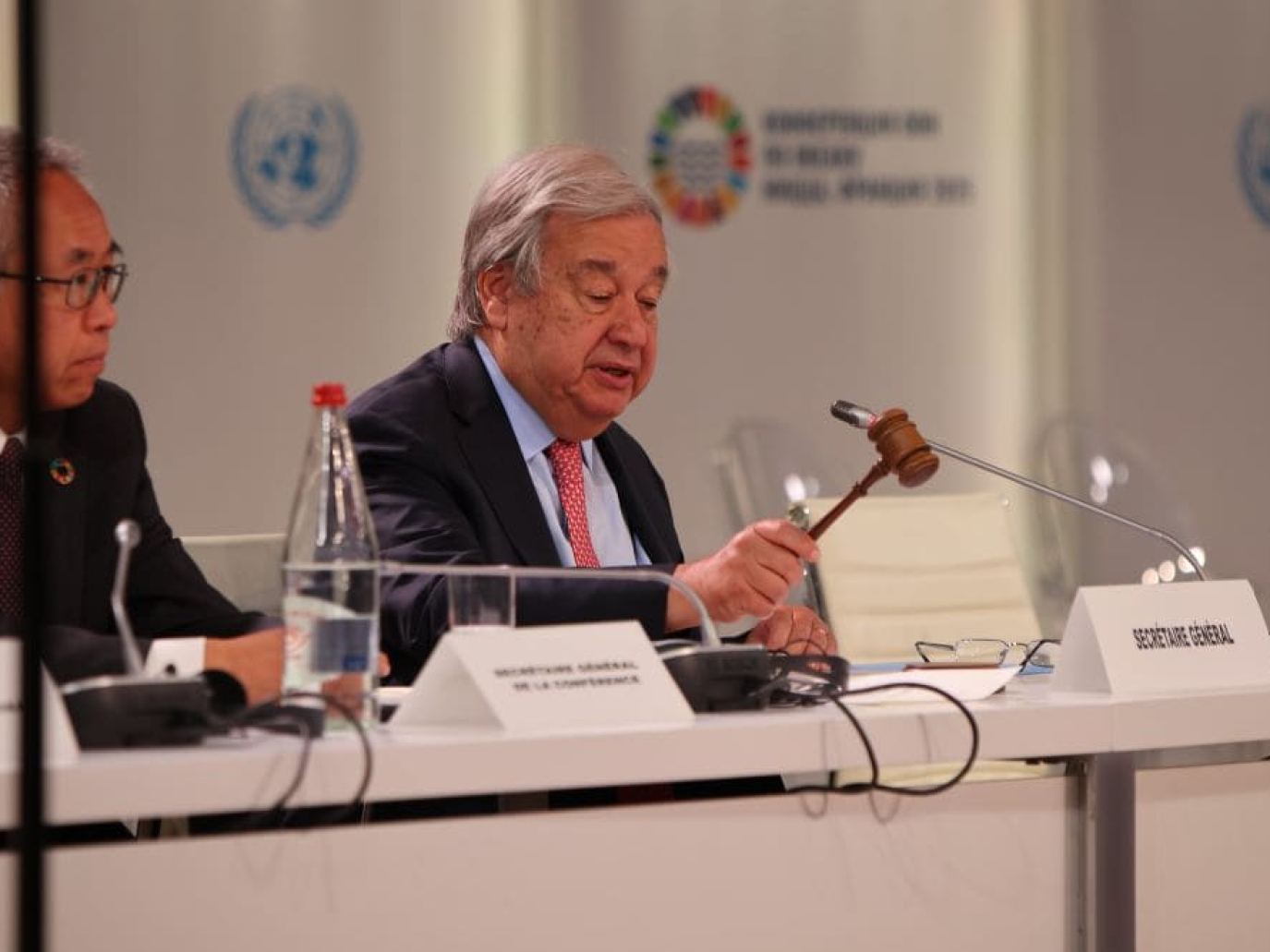This article is also available in Italian / Questo articolo è disponibile anche in italiano
Frome Nice - The Third United Nations Ocean Conference (UNOC3) concluded on Friday, the 13th of June in Nice, France. The conference aimed to accelerate action to achieve Sustainable Development Goal 14, “Life Below Water”. Despite some encouraging announcements of voluntary commitments by some Member States, observers overall rated the conference as disappointing due to the lack of concrete action reflected in the Nice Ocean Action Plan, the joint political declaration signed by governments, which represents a missed opportunity to protect the ocean.
According to experts at the Center for International Environmental Law (CIEL), “the Nice Political Declaration falls short of the commitments needed to protect the ocean, biodiversity, and climate from their greatest threat: fossil fuels. Halting the expansion of oil and gas, especially offshore, and rapidly and equitably reducing fossil fuel production and use must be at the heart of any action to protect the ocean and all life that depends on it”.
The ocean ecosystems are close to tipping points
Jean-Pierre Gattuso is a Senior Researcher at the CNRS and one of the organisers of the One Ocean Science Congress, the scientific meeting that took place in Nice the week before UNOC3 and which produced 10 scientific recommendations to protect the ocean.
“The One Ocean Science Congress had the great honor of addressing the UNOC3 delegates in the closing plenary session,” Gattuso wrote on LinkedIn. “We welcomed the progress made in recent days. Commitments were made, partnerships were launched, and coalitions were developed. These are clear indicators of positive momentum. However, we spoke honestly. There is still much to do. We are not yet on the right trajectory. Time is of the essence. Many ocean ecosystems are already approaching critical tipping points. The consequences of further delays will fall especially on the most vulnerable populations. Urgent and decisive action is needed, starting now. There is no excuse for waiting until the Fourth United Nations Ocean Conference.”
Progress towards ratification of the High Seas Treaty
During UNOC3, 19 countries deposited their ratifications for the Treaty on the High Seas, bringing the total number of countries that have ratified it to 50. 60 are needed for it to enter into force. Several countries have indicated their intention to deposit their instruments of ratification at the UN shortly, which could mean that the Treaty's entry into force could be activated in the coming weeks, before the next meeting of the UN General Assembly in September.
Upon entry into force, the Treaty will allow for the establishment of marine protected areas in the High Seas (of which only 1.5% is protected today), a necessary condition to try to reach the goal of protecting 30% of the ocean by 2030 (goal 30x30).
Currently, only 8.3% of the world's oceans are designated as marine protected areas (MPAs), and most of them are either nominally protected or so laxly regulated that destructive activities such as bottom trawling are permitted within them.
During UNOC3, French Polynesia, Samoa, Portugal, Colombia, and the Marshall Islands announced the creation of marine protected areas in their territorial waters. “All together, [these new marine protected areas] represent only a fraction of 1% of the world’s oceans. So, we are between 8% and 9% of the ocean protected,” said Enric Sala, marine biologist and founder of the National Geographic Pristine Seas project.
“All the protection we have achieved in the last 50 years, we need to quadruple in the next 5. So this conference was promising because there were new announcements, but at the same time, disappointing because of the lack of concrete actions. The pace of ocean conservation is glacial. We cannot be naively optimistic; we have to be realistic. The countries of the world, especially the rich ones, need to follow the example of some of these nations in the global south, especially those that are protecting 30% of their waters by 2030.”
New ocean financing and commitments to sustainable performance
According to the report, The Ocean Protection Gap, published shortly before UNOC3, only two countries, Palau and the United Kingdom, have effectively protected more than 30% of their waters, and there is a global deficit of 14.6 billion dollars in ocean protection.
On the 7th and 8th of June, the Blue Economy and Financial Forum took place in Monaco to raise public and private funds for the development of virtuous activities at sea and on the coasts. The forum was attended by 1,800 people from almost 100 countries and numerous heads of state. New commitments of 8.7 billion euros were announced by 2030 (4 billion euros of public funding and 4.7 billion euros of private/philanthropic funding).
"These data are impressive and noteworthy. That said, I am a bit skeptical of the narrative that more funding equals more sustainability, conservation, etc," said to Renewable Matter Robert Blasiak, associate professor at Stockholm Resilience Centre - Stockholm University, where he works on sustainable ocean management and ocean conservation. “Our track record in converting funding into sustainable conservation outcomes has been mixed, and this calls for extreme caution to ensure that well-intentioned efforts do not trigger unintended negative consequences.”
Blasiak cites the example of perhaps the most high-profile blue finance operation in recent years: the debt-for-nature swap in the Seychelles, initially celebrated but more recently seen in a particularly harsh light.
“We often hear that the ocean simply needs more financing, but this ignores the fact that there has been exponential growth in multiple ocean-related sectors over the past two decades, so a huge amount of financing is flowing into the ocean”, he explains. “Perhaps a more important goal would be to ensure that any ‘conventional’ financing that flows into these rapidly expanding sectors is tied to sustainability outcomes, transparency in reporting, etc. This is the main goal of the BackBlue commitment by financial institutions. At the BEFF, multiple banks took this commitment, bringing over 3 trillion dollars in assets into this commitment. This not only pushes the financial industry to take proactive steps towards financing more sustainable activities, but it also creates an industry norm, and it enables civil society to monitor whether they are fulfilling their commitments or not. I suspect it has the potential to be extremely impactful.”
Beyond the funding gap narrative towards recognising ocean rights
“Although still too limited, there is a growing awareness that funding mechanisms must prioritise equitable access and direct support to indigenous and local communities, who are the frontline custodians of the ocean”, told to Renewable Matter Mere Takoko, Indigenous Ocean and Climate Conservationist and Chief Executive Officer of the Pacific Whale Fund. “Initiatives such as the Ocean Rise and Coastal Resilience Coalition, launched during UNOC3 and aimed at supporting vulnerable communities, are positive examples, together with efforts to strengthen the capacities of coastal communities to attract private sector financing for sustainable businesses.”
However, Takoko adds, “much remains excluded and to truly include the indigenous perspective on ocean conservation, financial justice must be unequivocally promoted and rights-based approaches must be ensured. This means moving beyond the ‘funding gap’ narrative, which often frames conservation as a problem of capital scarcity, and instead addressing the root causes of environmental degradation: destructive industrial practices and systemic inequalities. We need to explicitly enshrine the human right to a clean, healthy, and sustainable environment, ensuring that indigenous peoples’ self-determination and sovereignty are at the heart of all ocean governance decisions. […] Ocean protection is inextricably linked to ocean justice; without prioritising indigenous peoples’ rights, knowledge, and leadership, any global ocean conservation strategy will remain incomplete and ineffective.”
Mere Takoko, through the Whale Pacific Fund and in collaboration with Michelle Bender, a lawyer at Ocean Vision Legal, is fighting for the recognition of whales as legal persons.
“The law reflects who we are as a society and can help change our values,” said Michelle Bender of Ocean Vision Legal at a UNOC3 side event on the role of law in ocean literacy. “If the law tells us that the ocean is a resource, we have the right to exploit it. If the law recognises the rights of the ocean [and of marine organisms], then we have a more ethical relationship with it. Law can help us reinvent or restore our relationship with the ocean.”
A collective of French associations (Legal Wild, Longitudes 181, Vagues ), US associations (Ocean Vision Legal, Earth Law Center), and the Global Alliance for the Rights of Nature have promoted the inclusion of ocean rights in the Nice Ocean Action Plan.
“Unfortunately, we have not managed to obtain the inclusion of ocean rights in the final declaration, despite our multiple requests and alliances on this issue,” told to Renewable Matter Marine Calmet, an attorney at Legal Wild and author of the book Justice pour l'étoile de mer: Vers la reconnaissance des droits de l'océan (Justice for the Starfish – Towards Recognizing the Rights of the Ocean).”
Global plastics treaty, noise pollution, and harmful fishing subsidies
In a side event at UNOC3, more than 90 United Nations Member States reaffirmed their commitment to negotiating an ambitious global plastics treaty through the Nice Wake Up Call for an Ambitious Plastics Treaty. Confirming previous statements made last year during the fifth round of negotiations (INC-5) in Busan, South Korea, countries reaffirmed their willingness to conclude an ambitious treaty that includes the full lifecycle of plastics.
Responding to this statement, more than 230 civil society organisations, including representatives of Indigenous Peoples, waste collection organisations, and communities on the frontlines of the plastics crisis, are calling on Member States to not back down on their ambitions and to strengthen them when negotiations resume in Geneva, Switzerland, in August.
During UNOC3, the High Ambition Coalition for a Quiet Ocean was launched by Canada and Panama, along with 35 other countries. The coalition aims to reduce noise pollution and its negative impacts on marine biodiversity and ecosystem resilience.
While in the fishing sector, several countries have announced the ratification of the Agreement on Fisheries Subsidies developed under the World Trade Organization (WTO). Ratified by 102 countries, the agreement will enter into force once it has been ratified by 111 countries and will prohibit harmful fishing subsidies, which are a key factor in the widespread depletion of global fish stocks.
Also presented during UNOC3 was Towards IPOS (Intergovernmental Panel for Ocean Sustainability), a science-policy interface initiative modeled on the Intergovernmental Panel on Climate Change (IPCC) and the Intergovernmental Platform on Biodiversity and Ecosystem Services (IPBES), that aims to strengthen the capacity of States to implement their global ocean commitments more efficiently, rapidly and inclusively.
Cover: Antonio Guterres © UN-DESA



